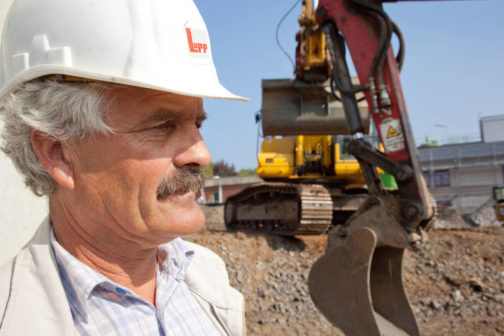In this article by Marcel Macherey and Dr Torg Middendorf, we get to learn about how SOKA-BAU has been addressing the need for social protection and welfare funds for construction workforce in Germany.
The construction industry is subject to high fluctuations and changes in work locations. The workforce in this industry is constantly affected by the lack of steady salaries and go through many insecure phases in their lives. They need social security and financial support to cope with the vagaries of the industry. Since 1949, SOKA – BAU caters to the needs of the German Construction industry through a range of services customised to the specific needs of the construction industry. In order to counter a pension shortfall and to open up new perspectives, SOKA-BAU applies sector-specific regulations, which are part of the Collective Agreement on the Social Fund Scheme in the Building Industry (VTV) and other collective bargaining agreements.

SOKA-BAU is the common name for two institutions: the Leave and Wage Equalisation Fund of the German Building Industry (Urlaubs- und Lohnausgleichskasse der Bauwirtschaft – ULAK) and the Additional Pay Scheme of the German Building Industry (Zusatzversorgungskasse des Baugewerbes AG – ZVK). Both of them are schemes of the parties to the collective agreement of the German building industry: Hauptverband der Deutschen Bauindustrie, Industriegwerkschaft Bauen-Agrar-Umwelt and Zentralverband des Deutschen Baugewerbes.
The tasks of the ULAK are the securing of leave entitlements and the financing of vocational training. With a retirement pension supplement the ZVK provides a compensation for structural disadvantages in old-age provision. Currently SOKA-BAU works on behalf of about 125,000 domestic and foreign companies with about 730,000 employees as well as 365,000 retirees.
Securing leave entitlements
 Due to the frequent change of production facilities (building sites) and the strong dependency on weather conditions, a regularly recurring loss of working time is characteristic of the building industry. Therefore more than half of all building industry workers do not have all year round contracts with one specific building company, which entails disadvantages both for the employee as well as for the employer in terms of leave. Applying the German leave legislation Bundesurlaubsgesetz (Federal Leave Law) most workers would not have the possibility to enjoy a continuous period of leave. In contrast the employer would run the risk of having to grant the full annual leave as well as the corresponding pay after six months of employment, even when the employee is not employed for the full calendar year. The Under the Leave Scheme of the German Building Industry the employee accumulates the leave entitlements while working for different employers of the building industry. To avoid excessive financial strain all employers of the building industry pay specific contributions to SOKA-BAU which are used to finance the leave entitlements.
Due to the frequent change of production facilities (building sites) and the strong dependency on weather conditions, a regularly recurring loss of working time is characteristic of the building industry. Therefore more than half of all building industry workers do not have all year round contracts with one specific building company, which entails disadvantages both for the employee as well as for the employer in terms of leave. Applying the German leave legislation Bundesurlaubsgesetz (Federal Leave Law) most workers would not have the possibility to enjoy a continuous period of leave. In contrast the employer would run the risk of having to grant the full annual leave as well as the corresponding pay after six months of employment, even when the employee is not employed for the full calendar year. The Under the Leave Scheme of the German Building Industry the employee accumulates the leave entitlements while working for different employers of the building industry. To avoid excessive financial strain all employers of the building industry pay specific contributions to SOKA-BAU which are used to finance the leave entitlements.
Retirement pension supplement
The above mentioned frequent change of production facilities and strong dependency on weather conditions also lowers the employees’ retirement pensions. To compensate for disadvantages in the statutory pension scheme workers in the construction industry receive retirement pension supplement which is financed by contributions of all employers in the construction sector..As ever less employees had to cover the entitlements of ever more retirees, since 2016 the pay-as-you-go-system is being replaced by a funding principle (“Tarifrente Bau”).
Financing of vocational training
All construction companies benefit from well-trained employees, but only about 25% of them are training employees. Therefore in 1975 the industry-wide financing of vocational training was set up by the parties to the collective agreement of the German building industry. The aim of the scheme is to maintain and promote the attractiveness of vocational training in the construction industry. All construction companies – including those who do not train someone – pay a specific contribution to the vocational training scheme. This contribution is used to finance all costs of training in the training schools. In addition, SOKA-BAU reimburses the companies for large parts of the apprenticeship pay.
About the authors
 Marcel Macherey (Diploma in Social Sciences) is working at SOKA-BAU since 2012. The focus of his work is vocational training and further education in the construction industry. This includes the monitoring of various education projects and the organization of conferences in this topic.
Marcel Macherey (Diploma in Social Sciences) is working at SOKA-BAU since 2012. The focus of his work is vocational training and further education in the construction industry. This includes the monitoring of various education projects and the organization of conferences in this topic.
 Dr. Torge Middendorf has been working at SOKA-BAU since 2013. He works as an economist, using in-house data on the construction sector to answer research questions. Furthermore, he acts as an advisor to the asset management team.
Dr. Torge Middendorf has been working at SOKA-BAU since 2013. He works as an economist, using in-house data on the construction sector to answer research questions. Furthermore, he acts as an advisor to the asset management team.
Subscribe to our YouTube channel for more updates:
Subscribe on YouTube



Comments 1